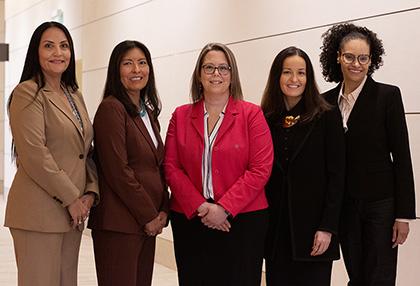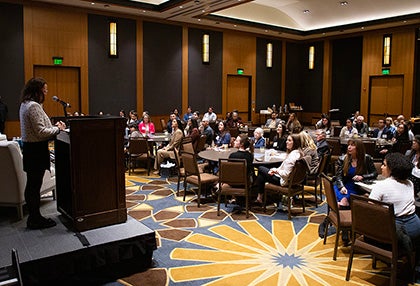UCLA Law hosts historic gathering of Native American judges
Native Nations Law and Policy Center event brings sitting Native American federal judges together for the first time

When Judge Diane J. Humetewa joined the federal judiciary in 2014, she made history as the first Native American woman to serve as a U.S. federal judge. Today, she is one of six sitting Native American federal judges, all of whom are women.
In another historic happening, five of these six jurists gathered for the first time to participate in a panel hosted by the UCLA School of Law’s Native Nations Law and Policy Center. The April 17 discussion, “The Native Bench: Justice, Democracy, and the Federal Judiciary,” offered the judges an opportunity to share their backgrounds, insights, and advice with UCLA Law students, faculty, and other attendees. The event, held at the UCLA Luskin Conference Center, was sponsored by the Yuhaaviatam of San Manuel Nation, the Native American tribe formally known as the San Manuel Band of Mission Indians.
Calling the convening a “remarkable moment” and noting the timeliness of holding a conversation on the judiciary’s role in democracy, UCLA Law professor and panel moderator Angela R. Riley introduced the attending judges. Joining Humetewa, who serves on the U.S. District Court for the District of Arizona, were Judge Lauren J. King of the U.S. District Court for the Western District of Washington, Judge Sunshine S. Sykes of the U.S. District Court for the Central District of California, Judge Sara E. Hill of the U.S. District Court for the Northern District of Oklahoma, and Judge Ada E. Brown of the U.S. District Court for the Northern District of Texas.
“Hopefully we will see more Native judges in the future and inspire more people to pursue this path,” said Riley, who is also the director of the Native Nations Law and Policy Center.
Sykes, who didn’t know any lawyers growing up on the Navajo Nation Reservation in Tuba City, Arizona – watching the fictional Perry Mason on afternoon TV motivated her to pursue a legal career – said it is important for youth to see themselves in the judiciary.
“If you can see it, you can be it.”
 Expertise in Indian law has been remarkably helpful for Judge Hill, the most recent appointee, as her Oklahoma docket is mostly Indian Country cases. Prior to her appointment, Judge Hill served for four years as the attorney general for her tribe, the Cherokee Nation. “I’m glad to be able to bring my experience to the issues that come before me,” she said, but added that it is important for the legal field to address what she calls an “education gap” in how Indian law relates to federal law.
Expertise in Indian law has been remarkably helpful for Judge Hill, the most recent appointee, as her Oklahoma docket is mostly Indian Country cases. Prior to her appointment, Judge Hill served for four years as the attorney general for her tribe, the Cherokee Nation. “I’m glad to be able to bring my experience to the issues that come before me,” she said, but added that it is important for the legal field to address what she calls an “education gap” in how Indian law relates to federal law.
“Indian country issues have been important parts of federal law since the United States was established. Federal judges use the same tools – the text of the laws and treaties, the facts unique to each case, and relevant precedent, to decide cases in the Indian law context. Becoming familiar with Indian law should be a high priority for any federal lawyer or judge.”
King agreed and suggested that Indian law should be a required law school course. “We all benefit from having judges with this background.”
The judges spoke about the need for greater civic awareness among the public as well – understanding what the three branches of government are, why they are separate but equal, how judges make decisions based on precedent, and which courts hear particular cases.
“Each of us as judges can have a role in educating youth and adults on the role of the judiciary in democracy,” said Sykes.
The judges spoke enthusiastically about their love of the job. They enjoy the wide range of issues that come before them, overseeing jury trials and mentoring law clerks. Their advice for law students seeking federal court positions: Highlight your research and writing skills and be careful what you post on social media.
“Don’t do anything you are going to regret at a senate judiciary hearing,” said King.
For UCLA Law students, the benefits of attending the panel far exceeded any practical advice they received.
Sierra Knudsen ’27, who came to UCLA Law because of the strength of the school’s Native Nations program, said it was very emotional just to be in the room with the esteemed panel of federal, female, Native judges. “Hearing their journeys and seeing how much impact they have in their communities was very validating of my values and motivations for being here in law school and my aspirations for my career.”
Humetewa is also inspired by her fellow jurists. She described feeling as though “a burden has been lifted” as she sees more Native women become federal judges. She was confirmed over a decade ago, and the other women joined the bench between 2019 and 2024. “I see my end on the horizon but that’s okay because a door has been opened,” she said.
“Remembering the words of Sandra Day O’Connor, I may have been the first, but I’m not going to be the last.”